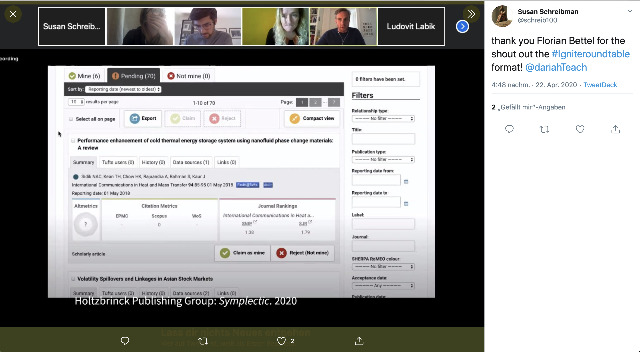Digital Knowledge about Research and Teaching – A User-Centred Design Approach
Lecturer
Date
- 22 April 2020– 16:00– Wien, Österreich, Online
Keywords
Cultural Studies, Software Development, Science and Technology Policy, Science Communication
Abstract
The digital organisation of knowledge about current research and teaching at universities and non-university research institutions has undergone professionalisation, international networking and standardisation as well as increased commercialization in recent years. Novel digital tools enable artists and scientists to communicate with various forms of the public about their work. These tools often implement evaluation criteria that have been borrowed from specific scientific disciplines and are sold as a commercial product (e.g. Impact Factor). In this way, these evaluation criteria as well as specific forms of organising knowledge become manifest in disciplines in which previously completely different criteria were common. Against this background, the project “Portfolio/Showroom—Making Art Research Accessible” has set itself the goal of developing a current research information system that is thought out of the needs of the artists and scientists. The focus is not on the evaluation and analysis of the information entered, but on the question of how a digital tool can support day-to-day work, how and what should be communicated and in what terms can one think about one’s own work. The project relies on a user-centred design and a user-driven software development that focus on the requirements that artists and scientists place on a digital solution that fits their needs. Portfolio was released as an open source web application in summer 2019. In conjunction with the second application Showroom, these web applications were developed in accordance with the FAIR principles, which, however, were thought from the perspective of the users (“findable” in this context means for example “Where have I published the paper together with my colleague in 2012?”). The contribution would like to take a critical look at the results of the software development process, the partially implemented features, it wants to locate the “Portfolio” application in the context of an increasing commercialisation as well as monopolising knowledge, and ask the question how to meet the needs of standardisation and when non-disciplinary logics are adopted.
Description
Session Moderator: Costas Papadopoulos (Maastricht University) Guest Speakers: Eveline Wandl-Vogt—Austrian Academy of Sciences (Austria) Makers Make: Creating Humanity Centered Open Organizations for the Purpose of Good Ludovit Labik—Tomas Beta University (Czech Republic) Filmmakers Collaboration on the World’s Digital Revolution Florian Bettel—University of Applied Arts Vienna (Austria) Digital Knowledge about Research and Teaching – A User-Centred Design Approach Natasha Gomes—Goa University (India), Akshata Bhatt & Palia Pandit—Dhempe College of Arts and Science (India) Design-Thinking Formal Correspondence: Gamification as Learning Intervention in Curriculum Delivery The panel was commented live on Twitter, where also additional information was provided: https://twitter.com/dariahTeach/status/1252971219864993792
Title of Event
IGNITE Digital Roundtables
Organiser/Management

Activity List
-
- Nirmalie Mulloli - Panelist
-
Locations
Addresses
- Wien, Österreich
- Vienna
- Austria
- Online
Associated Media Files
 Image#1
Image#1 Image#2
Image#2 Image#3
Image#3 Image#4
Image#4



